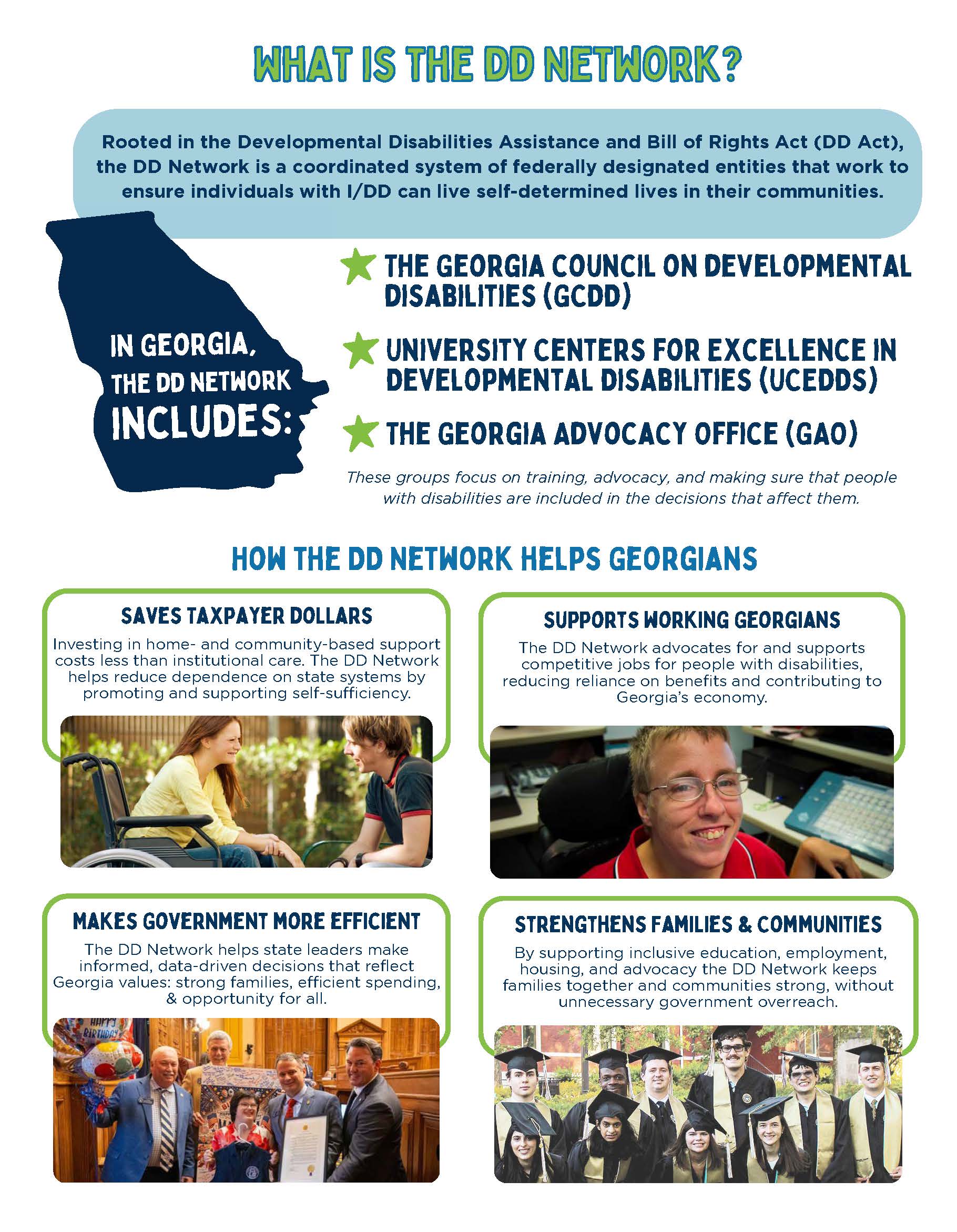What Does GCDD and the DD Network Do?
Rooted in the Developmental Disabilities Assistance and Bill of Rights Act (DD Act),the DD Network is a coordinated system of federally designated entities that work to ensure individuals with I/DD can live self-determined lives in their communities.
 Download a PDF flyer of this informationIn Georgia, the DD network includes:
Download a PDF flyer of this informationIn Georgia, the DD network includes:
- University Centers for Excellence in Developmental Disabilities (UCEDDs)
- The Georgia Council on Developmental Disabilities (GCDD)
- The Georgia Advocacy Office (GAO)
These groups focus on training, advocacy, and making sure that people with disabilities are included in the decisions that affect them.
How the DD Network helps Georgians:
- Saves Taxpayer dollars Investing in home- and community-based support costs less than institutional care. The DD Network helps reduce dependence on state systems by promoting and supporting self-sufficiency.
- Supports working Georgians. The DD Network advocates for and supports competitive jobs for people with disabilities, reducing reliance on benefits and contributing to Georgia’s economy.
- Makes Government more efficient. The DD Network helps state leaders make informed, data-driven decisions that reflect Georgia values: strong families, efficient spending,& opportunity for all.
- Strengthens Families & Communities. By supporting inclusive education, employment, housing, and advocacy the DD Network keeps families together and communities strong, without unnecessary government overreach.
The Power of Partnership: Georgia’s DD Network
The Georgia Council on Developmental Disabilities (GCDD) works to create systems change through public policy, advocacy, and community advancement. With a mission to include all people in all parts of their own lives, GCDD supports initiatives that promote inclusive education, accessible housing, and meaningful community engagement. GCDD also engages directly with Georgians with disabilities and their families to ensure their voices drive the change they want to see. https://gcdd.org/
The Institute on Human Development and Disability (IHDD) at the University of Georgia is one of Georgia’s two UCEDDs, working to ensure people with disabilities can live full lives in their communities. IHDD focuses on employment, relationships, and reducing isolation—supporting initiatives like Farm Again, which helps farmers and veterans with disabilities thrive through accessible agriculture. The institute also addresses the direct support workforce crisis by training professionals and advocating for better jobs in the field. https://www.fcs.uga.edu/ihdd
The Center for Leadership in Disability (CLD) at Georgia State University is the other UCEDD, focused on training future leaders and professionals to better support people with disabilities. CLD runs the LEND program, which has trained thousands of healthcare providers, educators, and advocates, and offers the IDEAL program to provide students with intellectual disabilities a full college experience. In collaboration with DD Network partners, CLD helps shape policies that promote liberty across the state. https://cld.gsu.edu/
The Georgia Advocacy Office (GAO) is the state’s Protection and Advocacy (P&A) agency, working to protect the civil and human rights of people with disabilities. GAO provides legal advocacy, investigates abuse and neglect, and challenges systems that deny individuals with disabilities their right to live, work, and thrive in the community. As an independent watchdog, GAO holds institutions and policymakers accountable and ensures the voices of people with disabilities are heard. https://thegao.org/
While not part of the DD Act network, the Georgia Statewide Independent Living Council (SILC) is a key ally in advancing disability rights and inclusion. SILC works to promote independent living for all people with disabilities, supporting the infrastructure and programs that allow individuals to live in the community with dignity and autonomy. https://www.silcga.org/